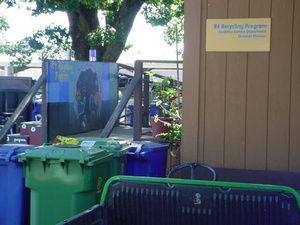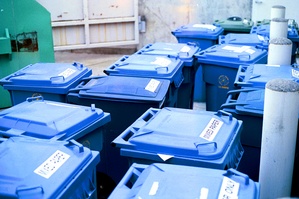| Location |
| Mrak Hall Suite 436 (Fourth Floor of Mrak Hall) |
| Hours |
| Mon-Fri 10AM-2PM |
| Phone |
| (530)752-7456 |
| Fax |
| (530)752-2553 |
| Website |
| http://sustainability.ucdavis.edu/topics/waste_reduction/index.html |
In January 2011, the Waste Reduction and Recycling (WRR) program, formerly known as R4 Recycling, transitioned into the Office of Environmental Stewardship and Sustainability. WRR is committed to maintaining effective and responsive waste reduction services on the UC Davis Campus by working with the Custodial Division, Grounds Division, Solid Waste Services, and many other campus departments. Furthermore, WRR is fully dedicated to supporting the campus community through sustainability education and offering students and staff tips to live a healthier, more sustainable lifestyle. WRR is constantly innovating and implementing new ways to encourage recycling and composting efforts throughout the campus community.
WRR Background, History, and Goals
Waste Reduction and Recycling originally started out as R4 Recycling and was created in response to the passage of California Assembly Bill 939 (AB 939) and California Assembly Bill 75 (AB 75) in 1989 and 1999 respectively. AB 939, known as the Integrated Waste Management Act, stipulated that county and local governments divert at least 50% of their waste away from landfills by the year 2000. Similarly, AB 75 required state agencies and other large state facilities to divert at least 25% of their waste from landfills by 2002 and at least 50% by 2004. While UC Davis was legally exempt from AB 939 and AB 75 as a research-based institution, the University voluntarily committed itself to act in accordance with the law as a responsible and conscientious employer, educational establishment, and community member.
Through R4 Recycling, UC Davis has implemented numerous waste diversion programs to further Campus recycling efforts. In accordance with the aforementioned assembly bills, the Campus has adopted the following waste diversion goals and thus far has met each benchmark successfully:
- 50% by June 30, 2008
- 75% by June 30, 2012
- Zero Waste by 2020
The 4 R's
While the program is no longer called "R4 Recycling," the message of the 4 R's continue to be extremely relevant in the current sustainability efforts:
- Reduce: Waste prevention, or "source reduction," means consuming less and therefore throwing away less trash. This is the first and most preferred method of waste management because it mitigates the total amount of trash generated and prevents it from the onset.
- Reuse: Items and products can often be reused instead of buying or using a new one. Products can be reused by repairing them, donating them to charity, or simply finding a new use for them at home. Reusing products is advantageous because it forgoes the need to reprocess them at a recycling facility.
- Recycle: Recycling transforms materials that would otherwise become landfill waste into valuable, usable resources. Materials like glass, metal, plastics, and paper are collected and sent to facilities to be made into new materials or products. While recycling still requires energy and resource investments, it is often more beneficial to recycle than landfill.
- Re-buy: Close the loop! It is meaningless to recycle if nobody purchases or utilizes recycled products. Buying recycled products creates a larger demand for them and subsequently influences manufacturers to sell more recycled products.
Programs
 It's fun to explore this crevice.
It's fun to explore this crevice.
Some of the projects WRR staff have initiated throughout the UC Davis campus include:
Reusable mugs are a great way to reduce and reuse. WRR distributes awesome mugs at many campus events which can be used for discounts at the Coffee House or at your own convenience at home.
WRR oversees campus events to ensure that they adhere to campus policies and help the school towards its 2020 zero waste goal. This means that all waste from an event should be composted and recycled instead of being sent to the landfill.
Mini-bins are desk-side paper recycling bins with a small landfill attachment. These bins helps make recycling easy and accessible while discouraging landfill usage.
Construction and demolition related activities play a significant role on the campus landscape. It is important to ensure that new developments on the UC Davis campus do their part to forward Campus ideals and encourage waste diversion.
-
Multibins (recycling locations for CDs, cell phones, Inkjet cartridges, and batteries)
Electronic waste constitutes a major part of our modern day waste stream. However, unlike typical waste, electronic waste cannot be landfilled because it contains hazardous chemicals and materials which can leak into the surrounding environment and adversely affect peoples' health. WRR provides conveniently located Multi-bins around campus where community members can safely deposit batteries, CD's, printer inkjets, and miscellaneous electronic equipment. These are tall blue bins located at the ARC, Shields Library, Memorial Union, and the Silo.
-
Building Assessments
-
Composting food/paper waste from campus Dining Commons
-
Recycling Presentations
-
Recyclemania
-
Pipette Tip Boxes
-
Styrofoam and Packing Materials
-
Battery Boxes
 Some of the many R4 bins found outside the Social Sciences and Humanities Building.
Some of the many R4 bins found outside the Social Sciences and Humanities Building.
R4 History
-
Past Employees
Christa Jones (2005 - 2007): Zero waste.
Do you like recycling? And know something about web design? Apply now!
2005-02-28 13:02:52 Word has it that the administration is planning on cutting Zero-waste events, styrofoam recycling and worms! Who cuts worms? They are free! —MikeSiminitus
2005-05-24 03:43:54 Don't give up! Conservation must prevail. R4Ever!!!!!! Go Mike! I don't have compost, but I'm all about the rec bins. =) —EllenSeeley
2005-06-09 23:34:15 R4 is here to stay, so it seems. An extensive search for new student staff is underway. YES R4 IS HIRING! Call to apply! —MikeSiminitus




Comments:
You must be logged in to comment on this page. Please log in.